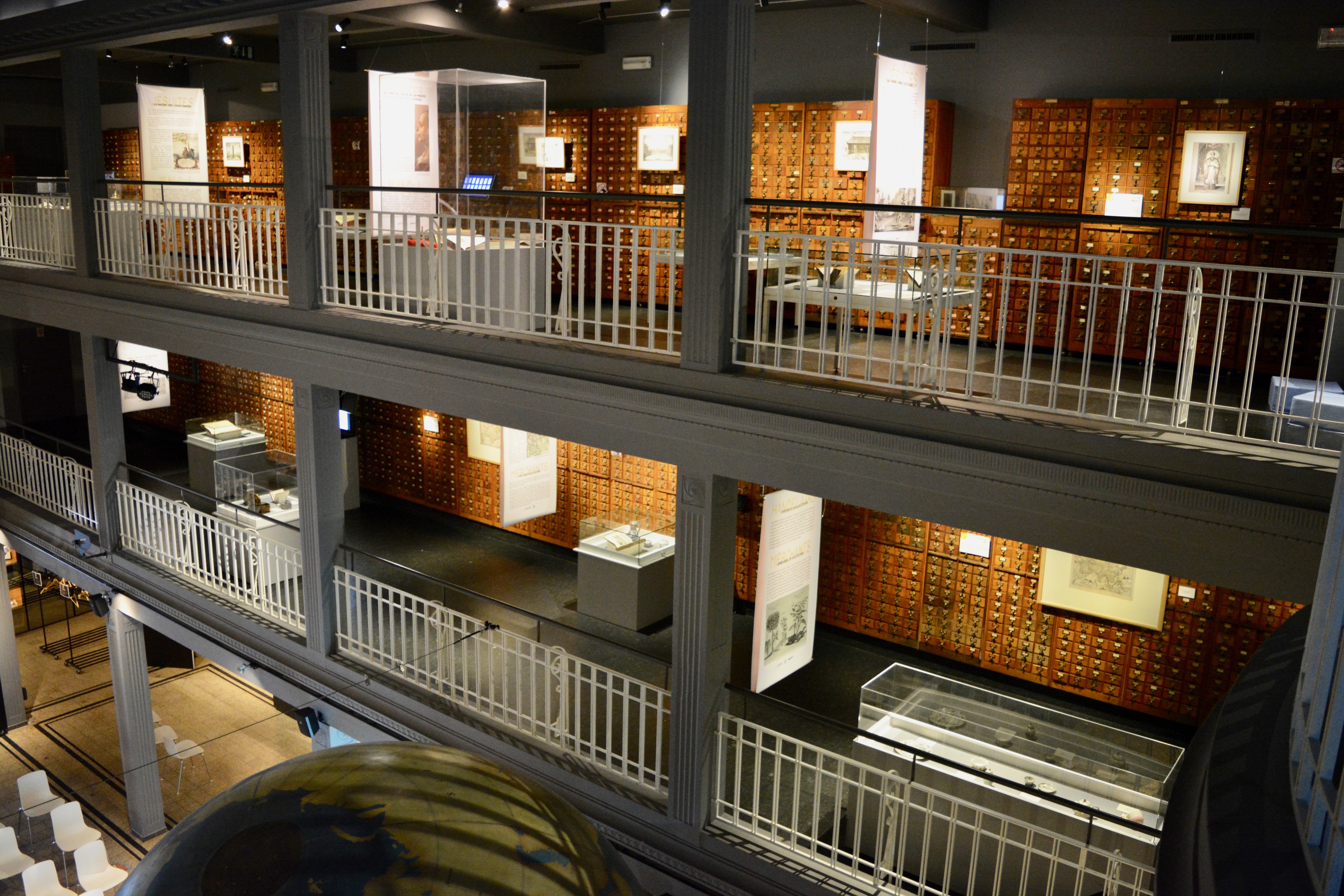A short train ride from Brussels, in the sleepy university town of Mons, Belgium, is an inconspicuous white building that houses a relatively obscure testament to humanity’s thirst for knowledge. Called the Mundaneum, the building houses an early-1900s attempt at collecting and cataloging the entirety of the world’s information, nearly a century before sites like Google and Wikipedia made access to such repositories easily accessible from anywhere with a Wi-Fi signal.
Founded by Paul Otlet and Henri La Fontaine, two Belgian lawyers with big turn-of-the-century futurist ideas, The Mundaneum began as a continuation of the duo’s earlier efforts to create the perfect classification system. Their index card-based Universal Decimal Classification (UDC) system—still used in over 150,000 libraries today—improved and expanded upon the existing Dewey Decimal System, methodically classifying all the factions of human knowledge into easily searchable groupings and subgroupings. Utilizing this system, the duo launched their Répertoire Bibliographique Universel or “Universal Bibliography Repertory” (UBR) project in 1895, which sought to catalog any-and everything ever published into a “global city of knowledge.”
Videos by VICE
Though it would be able to fit on a thumb drive today, this undertaking needed a vast amount of physical space in the analog age. Capitalizing upon the reconstruction efforts following World War I, Otlet and La Fontaine convinced the Belgian state to give them a wing of a government building in Brussels and funding to make their collecting and cataloging endeavor a fixed institution.
Soliciting help from an international network of colleagues, academics, and fellow information science nerds, Otlet and La Fontaine began receiving shipments of published works at the place they’d dubbed “Palais Mondial” or “World Palace.” Though limitations of the era prevented them from fully decentralizing the project, it’s this collaborative effort that’s pointed to when referencing the Mundaneum as a proto-Wikipedia. But it wasn’t just books, research, and newspapers sent their way. The Mundaneum was also cataloging glass photographic plates, films, audio recordings, pornography, and more. As each new work came in, the Mundaneum’s staff wrote up a corresponding UDC index card for walls of draws throughout the building before archiving the original. Over time, the catalog grew to over 18 million index cards.
This collection was not mean to be hoarded away. The Mundaneum’s creators were of the (then radical) mindset that knowledge should be shared with the common man. To that end, the duo founded a 150-room museum that displayed historically significant items and illustrations from the archive and opened it to the public. For a small fee, curious minds could also send queries to the catalog and have a staffer send them the requested info via telegram, sort of like a slower LexisNexis.
By the 1930s, Otlet and La Fontaine’s many cataloging endeavors, by now collectively referred to as The Mundaneum, had moved to a branch in the Hague where it remained through WWII, surviving Nazi Occupation of Brussels relatively unharmed, though some items were destroyed when the exhibit was replaced with third reich art during the occupation. Following one more move to a dilapidated building in the 1970s, where some of the archives suffered mold and water damage, the Mundaneum collection was finally transferred to its current, permanent home in a former department store in Mons where it now serves as a museum to Otlet and La Fontaine’s utopian vision.

The building’s three floors, bordered with the original cabinet drawers containing 12 million of the original 18 million index cards, is more than a mausoleum to an obsolete media storage system. As the museum’s deputy director Delphine Jenart explains, the Mundaneum’s subterranean archives are slowly being digitized by a handful of volunteers and, as nobody is quite sure of what’s in the stacks, the collection is a ticking time bomb of historical significance.
“Some books indexed in the UBR no longer exist or we don’t know or remember about them,” said Jenart. “We also have an index of international organizations that no longer exist that nobody knows ever existed so it will be interesting to see what turns up.”
Though the Mundaneum archives were compiled by high-minded scholars, they are nonetheless products of their era, and not all the treasure buried beneath the building is of the feel-good variety. Jenart told me that, with the original project focused on voraciously collecting all documents available, a number of documents that would be considered immoral, sexist, or otherwise problematic by today’s standards are present. That said, Jenart praised the “strong values” of the Mundaneum’s “anti-colonist” creators, noting that they “haven’t found anything racist” or anti-Semitic in the digitization process, the one exception to this rule being the propaganda poster section of the collection.
“They had this concern of sharing knowledge, but for the purpose of progressing humanity,” Jenart explained. “They wouldn’t collect things that didn’t serve that purpose.”
Otlet and La Fontaine didn’t live long enough to see their vision for a knowledge-connected Earth come to fruition, dying in 1944 and 1943 respectively, and it’s unlikely they’d be thrilled with the dystopian drawbacks of the information age. But their “paper search engine,” recognized for its historical significance by UNESCO in 2013, paved the way for the easy access to knowledge that we take for granted today, and is increasingly regarded as a basic human right.
“Tyrants or anti-democratic governments don’t like people to be too aware of things, too cultivated, too educated,” said Jenart of how the Nazi party’s disapproval of the Mundaneum ties to the disinformation and withholding of information campaigns happening around the world today. “Information is power. Knowledge is power. And the Mundaneum’s grand plan was to show this to the world.”
Follow Justin Caffier on Twitter.
Sign up for our newsletter to get the best of VICE delivered to your inbox daily.




